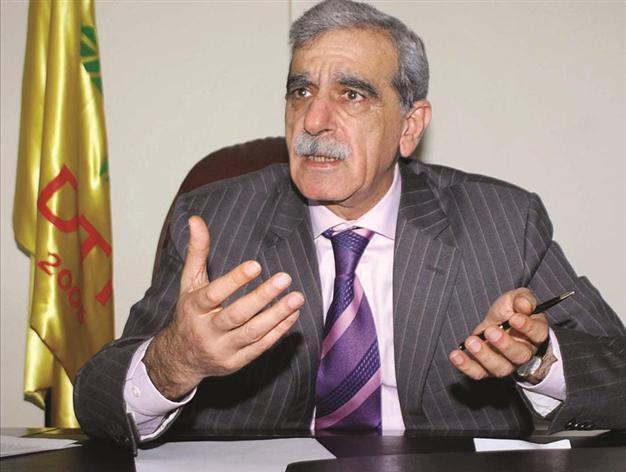Iran, Syria, Israel don’t want Kurdish solution, says Kurdish MP
ANKARA - Hürriyet Daily News

DAILY NEWS photo / Selahattin SONMEZ
A solution to Turkey’s Kurdish issue would do little to please regional actors to the south and east of Turkey, senior Kurdish politician Ahmet Türk has said.“There are many power groups who would be uneasy with peace in Turkey. Many countries do not want Turkey to resolve its Kurdish problem. If Turkey resolved its Kurdish problem fairly with a peaceful approach, it would be the strongest country in the Middle East and become a model for the region. But many countries do not want this [like] Iran, Israel and Syria. And we are not so sure that international actors want a resolution to the Kurdish issue,” Türk told Anatolia news agency.
“When we consider all of these factors, various powers are highly likely to have had a role [in the Paris murders] regardless of who the gunman is,” he said in reference to the murder of three Kurdish women, including Sakine Cansız, a founding member of the outlawed Kurdistan Workers’ Party (PKK), in Paris on Jan. 9.
A Paris prosecutor has revealed that Ömer Güney, a 30-year-old born in Turkey, is the prime suspect in the murders. Güney is believed to have joined the PKK two years ago, although a senior PKK member, Murat Karayılan, denied he was connected with the organization.
Türk, the head of the Kurdish umbrella organization the Democratic Society Congress (DTK) and an independent lawmaker, said Güney’s family identified themselves as Turkish nationalists and denied his relationship with Kurdish circles in France. It would not be correct to speak about Güney unless concrete evidence is revealed, Türk said, adding that Güney might have infiltrated the PKK for a certain purpose.
Asked whether the murders could be a result of an internal feud within the PKK, Türk said this theory was less likely.
“It cannot be the outcome of an internal conflict. They [the three murdered PKK members] are not included in the decision-making mechanism of the organization [PKK]. They were not members who could influence the decisions of the organization,” Türk said.
The Paris murders came as the government has launched a new initiative to find a peaceful resolution to the conflict between the PKK and Turkish security forces. The recent initiative is called the “peace process” or “İmralı process,” which refers to recent talks involving the PKK’s jailed leader, Abdullah Öcalan, who is serving a life sentence on the prison island of İmralı. In late December 2012, Prime Minister Recep Tayyip Erdoğan revealed that intelligence officials were holding talks with Öcalan to convince PKK militants to lay down their arms and withdraw from Turkish soil. On Jan. 3, Peace and Democracy Party (BDP) deputy Ayla Akat Ata and Türk were allowed to visit Öcalan as part of the process.
Recently, Turkish media reported that Türk and BDP co-chair Selahattin Demirtaş were set to pay a second visit to İmralı, but the visit did not occur after the Justice Ministry reportedly refused to grant permission.
One day earlier, Erdoğan had slammed BDP officials for criticizing the government over military operations against PKK militants. The second visit to İmralı was reportedly canceled due to the government’s unease over Türk’s criticism of military operations.
















